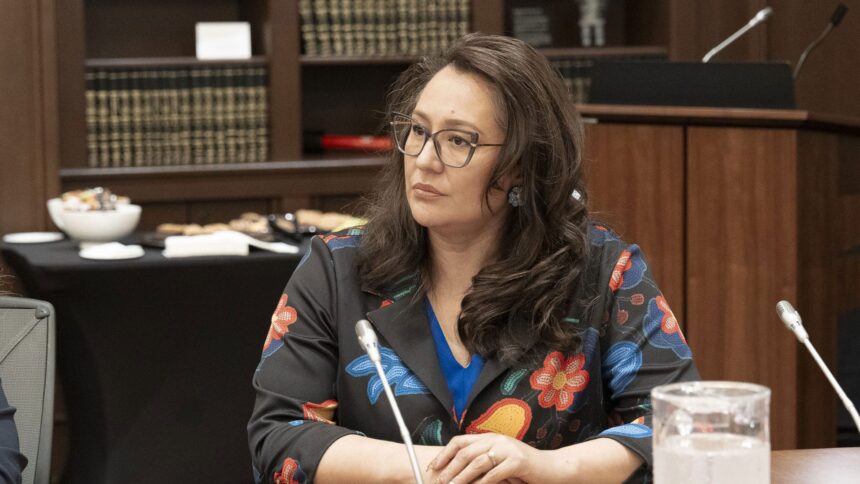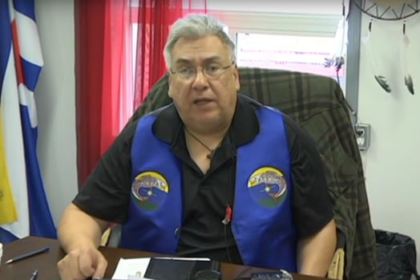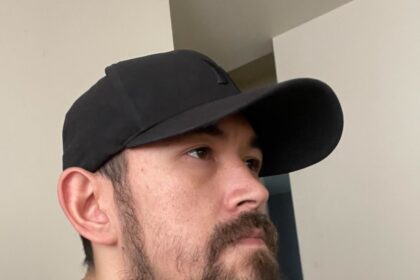Indigenous Services Minister Mandy Gull-Masty says she is planning changes to the Jordan’s Principle (JP) program after hearing repeated concerns from communities that lost funding under new rules issued in February. Gull-Masty said First Nations leaders have told her that a Feb. 10 operational bulletin added new rules for applications and restricted services, meaning they have struggled to keep services for children running and in some cases have been cut off. “The operational bulletin, although I’m sure was meant to try to address the complexities, I think it also further introduced additional complexities and a lot of additional constraints on how people can address,” she told APTN News. “That’s the exact opposite of what Jordan’s Principle is supposed to do.” Jordan’s Principle was created after Jordan River Anderson of Norway House Cree Nation spent his short life in hospital while governments argued over who should pay for his care. What began as a rule to stop such disputes has since been expanded by the Human Rights Tribunal to cover health, education, food, housing, mental health and other vital services — becoming a lifeline for many First Nations children. The minister said she has spent the summer speaking directly with First Nations leaders and intends to bring forward a new approach. “I want there to be a new approach to JP. I want JP to be integral to what it was supposed to be. I really wanna be sure that when we’re implementing what that solution is, it’s really driven and determined by First Nations,” she said. She added that she is open to solutions to address challenges in First Nations where programs have been cut or lost completely under the changes, such as the lack of access to professionals needed for paperwork under the system that was put in place in February. “I heard from communities about the challenges of being remote, not having proper access to healthcare to provide some of the documentation, removing those barriers, looking for those alternative voices that can attest. I think that’s really important,” she said. Decisions made in the February 10 bulletin by Indigenous Services Canada, then under minister Patty Hajdu, were meant to curb ballooning costs under Jordan’s Principle. ISC’s own documents showed spending climbed from $1.07 billion in 2020–21 to $1.7 billion in 2022–23, with forecasts tracking above $2 billion in 2024–25. To address the surging costs and ensure the program was “sustainable,” the department issued a bulletin that tightened eligibility, scaled back categories of support, and raised the bar for both individual and group applications. Those changes hit group applications especially hard. ISC acknowledged in internal documents that the new requirements would be difficult for some First Nations to meet. After Feb. 10, organizations had to list every child by name, confirm First Nations identity, and submit an individual needs assessment and professional letter for each child — requirements that could be especially challenging in remote communities without easy access to professionals. These conditions were applied not just to new requests but also to files already waiting in the queue. It’s not clear which communities the minister spoke to directly, but two communities told APTN news they have reached out to the department, after losing funding for groups services. The Chief of the Onigaming First Nation said his community has been under a state of emergency for more than a decade because of a suicide crisis and some of the Jordan’s Principle programs they were running were designed to stabilize youth. When the group applications were denied, the band began paying for the programs out of its own settlement trust while waiting for a longer-term solution with the department. ISC told the community it will try to help. The gym at the Onigaming school where funerals used to be held. Forty-three on-reserve members have lost their lives to suicide or illicit drugs in the past three years. The community lost all funding to Jordan’s Principle programs it was hoping would stabilize youth. Photo: Karyn Pugliese/APTN. In Tyendinaga Mohawk Territory, the community has been forced to cover the costs of 67 children with special needs returning to school this fall. The chief criticized Ottawa for delays in processing and said the federal government should have staffed up to handle applications and, if there were budget pressures, raised them at the cabinet table. The chief says he has written to the department. According to the operational bulletin, “school-related requests, unless linked to the specific health, social, or educational need of the First Nations child, would no longer be supported.” The bulletin said this was based on its legal analysis of “substantive equality” under Jordan’s Principle. That clause leaves it unclear why Tyendinaga’s school-based supports were cut off, but the community has been forced to pay for them in the meantime. At least two individuals have also gone to court. Read More: Mohawk students with special educational needs sidelined by Jordan’s Principle Confusion followed Ottawa’s crackdown on Jordan’s Principle as costs topped $2B Federal court appeal in Powless case could impact thousands of children cut off from Jordan’s Principle In June, the Federal Court ordered ISC to reassess the case of Scarlett, a five-year-old girl whose applied behaviour analysis therapy was cut after the bulletin. The court found ISC’s interpretation of substantive equality too narrow. In July, Justice Ann Marie McDonald ordered ISC to reconsider Joanne Powless’s request for mould remediation in her family home. The February bulletin said Jordan’s Principle would no longer support the purchase, construction, or structural renovation of homes unless such funding was required by substantive equality. The court ruled ISC’s reading of that clause was “unreasonably narrow.” The First Nations Child and Family Caring Society has urged families denied under the February directive to review their letters and consider reapplying for support. Continue Reading
ISC minister will revisit application requirements under Jordans Principle

Leave a Comment










